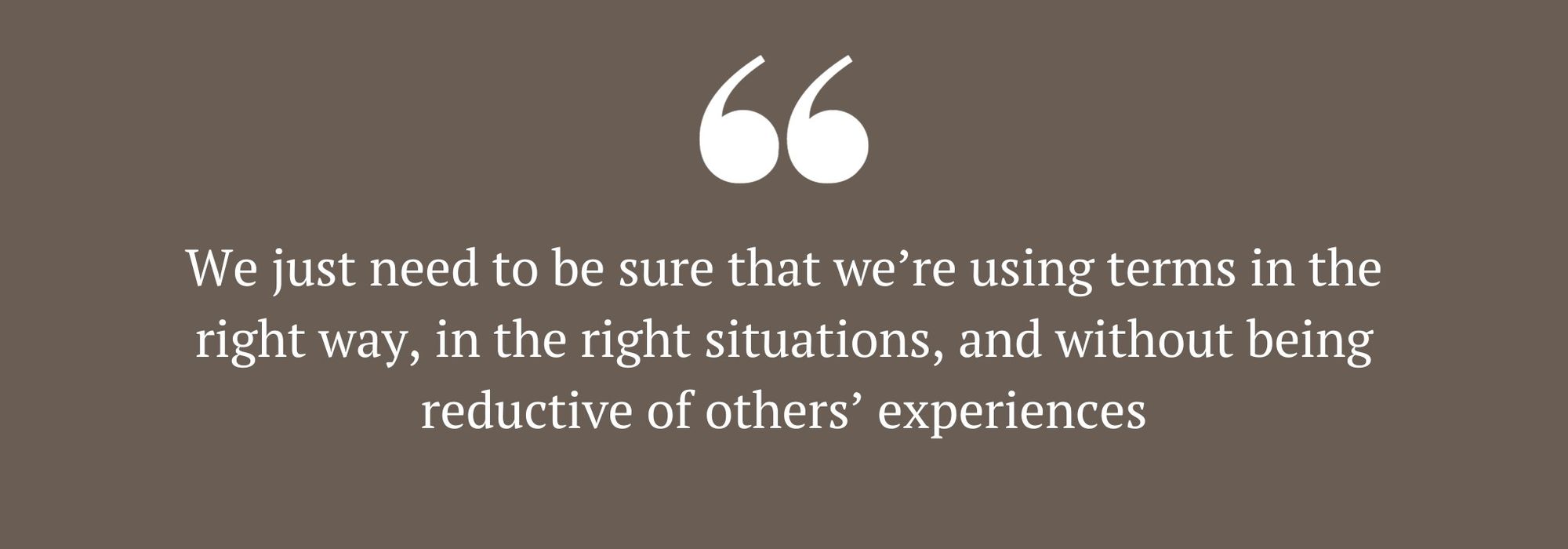What is therapy speak (and is it doing more harm than good)?
updated on Oct 27, 2023

Is the language we use around mental health becoming diluted, and starting to lose all meaning? Or are we misusing helpful terms without realising it?
Bringing mental health into mainstream conversation has certainly seen progress in recent years, with more and more people recognising how speaking up and sharing how we feel, and what we are going through, is good for us – and often, those around us.
Research published in the Community Mental Health Journal actually found that sharing our experiences makes us more willing to seek help when we are struggling, more aware of where we should look for that help, and more likely to encourage others to seek support when we see them struggling. So, what’s the impact of adopting terms used in therapy as part of our collective vocabulary? Shouldn’t having specific words we all know, understand, and can use, be beneficial all around?
What is therapy speak?
Therapy speak, also referred to as therapy dialogue, is a term used for the language previously reserved for the therapy room, that’s seeped into our everyday lives. Talking about setting healthy boundaries, joking about coping mechanisms, calling out toxic, trauma-dumping behaviours, or highlighting when we’re left to do all the emotional labour, can all be examples of ways therapy-related terms have made it into the mainstream.
But… isn’t that a good thing? Just like we’ve all learned a little more about mental health and wellbeing, isn’t knowing the right language to talk about these things great, too?
Honestly, that depends on the context. When everything starts being called a red flag, every friend’s bad day is seen as ignoring our boundaries or being toxic, slightly differing memories of an event get called out as gaslighting, and everyone who doesn’t put our needs first is called a narcissist, it can be a sign that – just maybe – we aren’t all fully understanding the phrases we’re using. And over time? This can lead to certain words, phrases, and explanations feeling like they are losing their meaning.

Why has therapy speak become more mainstream?
With the growing open-mindedness in terms of seeking support, therapy is no longer seen as a last resort when you hit rock bottom. More young people and men have begun seeking therapy, according to the British Association for Counselling and Psychotherapy, while NHS England saw 1.24 million referrals for Improved Access to Psychological Therapies (ITAP) services in 2021–22 – an increase from 1.02 million in 2020–21. Counselling Directory alone saw 24 million users accessing information about mental health and wellbeing between 2017–22, suggesting more and more of us are ready to start looking for information on how we can put our mental health first.
As we start to feel more comfortable talking about our mental health, it should come as no surprise that more of us are encountering words previously reserved for the therapy room. Even mainstream sources of entertainment and news are starting to include these kinds of terms to draw us in and keep our eyes focused firmly on what they have to say about the latest industry buzzwords.
Our increased use of therapy-related terms can also be seen as more of us wanting to better understand ourselves, our experiences, and our situations, through shared language and terms we can (almost) all understand. But sometimes, that language can get a little bit lost in translation. We can start to take hyperbole literally. And, despite our well-meaning intentions, we can unintentionally start to see words losing some of their impact.
Can using therapy speak be problematic?
Therapy speak in itself isn’t a bad thing; it can give us a shared language to better understand ourselves, our life experiences, and our situations. But sometimes, when words get misused or misconstrued over time, it can be a problem – for us, and for those whom the original language was intended to help.
For example, we’ve all come to learn that the phrase ‘everyone’s a little bit OCD’ isn’t acceptable – or helpful. It’s something that people used to like to say jokingly, or as a way to relate to each other, or even to explain what they saw as ‘quirks’. But thanks to people with lived experiences with obsessive compulsive disorder (OCD), as well as mental health experts and leading mental health charities speaking out, we’ve collectively come to understand why using the diagnosis – and people’s experiences – with OCD can be reductive, unhelpful, and sometimes outright harmful for those living with OCD. Misusing the term can lead to misinformation (people misunderstanding what OCD is, how serious it can be, or normalising behaviours that are actually signs that they need help), and a general perception that ‘it isn’t that bad’ if everyone has some level of experience with it.
We’re seeing similar conversations around neurodivergence right now, with many people struggling to see the problems it can cause when we think of ‘everyone as a little bit neurodivergent’. This can end up leading to people who need extra support being refused accommodations, facing a lack of understanding, and having to put in additional time and effort into educating others about neurodivergence and neurotypicality. While people may try to relate from a well-meaning place, or with the intention of being comforting by saying we’re all not that different, it ends up ignoring or minimising the negative impact that everyday systems – built for the majority of people, who aren’t neurodivergent or experiencing mental ill-health – can have.
That’s not to say that we shouldn’t ever use therapy speak. If you find it helpful to apply to yourself, your lived experiences, or to explain how you are feeling, it can be a great starting point to find out more about where you can get the right kind of help and support, as well as what kinds of coping mechanisms or strategies could be good to try. But it’s also important to remember that there’s a difference between a diagnosis and an opinion.

Can therapy speak be helpful?
Keeping therapy terms in our everyday conversations (both on and offline) can still be really helpful, as the more we talk about therapy and our lived experiences, the more people can understand and (hopefully) be helped by accessing and using this language themselves, too. We just need to be sure that we’re using terms in the right way, in the right situations, and without being reductive of others’ experiences.
Finding the right help for you
Reading up about these concepts from therapy speak, understanding them, and using them in our day-to-day lives, might be helpful for some of us – but it isn’t a replacement for a clinical diagnosis, or for support from qualified professionals and medical experts.
It’s also important to remember that you don’t need a specific problem to start therapy. Working with a therapist can be, well, a therapeutic experience in and of itself. Counselling provides a safe, judgement-free, confidential space where you can open up, and explore general feelings of worry, discontent, concerns, or even life goals. There doesn’t have to be one ‘big problem’ or catalyst event to ‘justify’ you going to therapy. Happy people also go to therapy. Not everyone knows exactly what they want to talk to a therapist about, or have a clear pathway towards what they want to ‘get out of therapy’ – and that’s OK.
And if you want to take that language outside of the therapy room, that’s fine! Just be careful you’re using terms as they’re intended.

